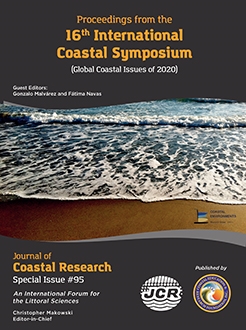Lou, S.; Liu, H.Z.; Chen, M.; Liu, S.G., and Zhong, G.H., 2020. Laboratory study on solute transport affected by rigid vegetation. In: Malvárez, G. and Navas, F. (eds.), Global Coastal Issues of 2020. Journal of Coastal Research, Special Issue No. 95, pp. 77-82. Coconut Creek (Florida), ISSN 0749-0208.
Aquatic vegetation is ubiquitous in riverine and estuary environment. With the presence of vegetation, velocity and solute transport can be greatly impacted. In this paper, laboratory experiments were carried out to analyze the influence of rigid vegetation on flow velocity and solute transport. Results have shown that the mean velocity is significantly reduced by vegetation and the maximum values of solute concentration decrease more rapidly with lower relative water depth (ratio of vegetation height to water depth). The longitudinal diffusion coefficients are found to be related with Reynolds number positively and vegetation density negatively. A modified function is proposed in this paper to effectively estimate the longitudinal diffusion coefficients, which can be used under both emergent and submerged vegetation conditions.





